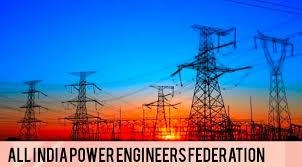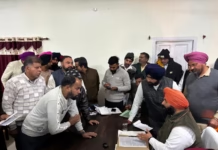Power Employees, Engineers to protest in Delhi against privatization of Electricity and the Electricity (Amendment) Bill 2025
Kanwar Inder singh/ royalpatiala.in News/ November 5,2025
National Coordination Committee of Electricity Employees and Engineers (NCCOEEE) will hold a massive rally at Jantar Mantar in the New Delhi on January 30 against privatization of electricity and Electricity (Amendment) Bill 2025 and electricity employees and engineers from all states across the country will participate in it.
V K Gupta informed thay the meeting was attended by All India Power Engineers Federation (AIPEF) Chairman Shailendra Dubey and Secretary General P. Ratnakar Rao, and Mohan Sharma, Sudeep Datta, K. Ashok Rao, Krishna Bhoyur, Laxman Rathod, Santosh Khumkar, and Sanjay Thakur and otherd.
It was also decided to form a united front with farmers’ and common consumers’ organizations to launch nationwide movement against electricity privatization and the Electricity (Amendment) Bill 2025. The first meeting of the united front will be held in Delhi on the upcoming December 14.
NCCOEEE has demanded that the Central Government immediately withdraw the anti-farmer, anti-consumer, and anti-employee Electricity (Amendment) Bill 2025. It was decided that 2.7 million power employees and engineers across the country will be forced to launch a nationwide movement against the Electricity (Amendment) Bill 2025 and the privatization of the power sector if the Government of India fails to listen to their voice.
In a statement issued today, AIPEF Chairman Shailendra Dubey said that through the Electricity (Amendment) Bill 2025, the Central Government wants to privatize the entire energy sector of the country. After privatization, electricity rates will become so high that they will be beyond the reach of farmers and common consumers.

He said that through Sections 14, 42, and 43 of the Amendment Bill, private companies are being given the right to use the network of government electricity distribution companies to supply power, and in return, they will pay only nominal wheeling charges to the government DISCOMs.
The financial burden of this will fall on the government electricity distribution corporations, while private companies will be given the freedom to earn money through this network.
They said that under this Amendment Bill, private companies will not have the obligation of universal power supply.
They said that the Amendment Bill proposes to amend Section 61(g) to eliminate cross-subsidy within the next five years. Along with this, the Bill provides that electricity tariffs should be cost-reflective, meaning no consumer should be supplied electricity at a price lower than the cost. This means that farmers will have to pay at least Rs. 12,000 per month as an electricity bill for a 6.5 horsepower pump if it runs for six hours a day. Similarly, electricity rates for consumers below the poverty line will become at least Rs. 10–12 per unit. Further, the Bill proposes to promote virtual power markets and market-based trading systems. This will destabilize long-term agreements and make the cost of power more volatile.
They said that electricity is listed in the Seventh Schedule of the Constitution under the Concurrent List, which means that the central and state governments have equal rights in matters of electricity. Through this Amendment Bill, the Central Government is taking away the rights of the states in electricity matters, and there will be direct intervention by the Central Government in electricity distribution and tariff determination, which is against the federal structure and spirit of the Constitution.













